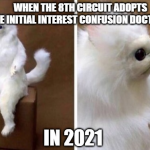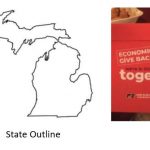
RedBubble Gets Another Favorable Ruling–YZ Productions v. RedBubble
Rebecca Zamolo appears to be a YouTuber/influencer who merchandises her brand in multiple ways. She claims that RedBubble users are infringing her IP and counterfeiting her offerings. The complaint includes many images showing the alleged infringements, such as: The court…

Ohio Bans Competitive Keyword Advertising by Lawyers
No one: Absolutely no one: Ohio Board of Professional Conduct (in the third decade of the 21st century….): * * * I guess we’re doing this again. It’s 2021, long past the time consumers have come to understand competitive keyword…

Want to Engage in Anti-Competitive Trademark Bullying? Second Circuit Says: Great, Have a Nice Day!–1-800 Contacts v. FTC
Starting in the mid-2000s, 1-800 Contacts sought to control how its competitors bought search engine advertising triggered by its (so-called) trademarks, a process I call competitive keyword advertising. To do this, 1-800 Contacts typically sued its competitors and then quickly…

Eighth Circuit Embraces the Initial Interest Confusion Doctrine. What??? UGH. No. Why???–Select Comfort v. Baxter
The initial interest confusion doctrine has always been a misguided doctrine that is too easy for plaintiffs to weaponize. Fortunately, the doctrine has been dying for over a decade. Few opinions mention it nowadays, and even fewer cite it in…

Depiction of Michigan as Hands Doesn’t Preclude Similar Depictions–High Five v. MFB
High Five Threads sells t-shirts and tchotchkes. It claims copyright and trademark protection for a depiction of upper and lower Michigan as two hands (left-most image below). People routinely depict lower Michigan as a hand, and apparently others envision the…
Broadcaster Fails to Enjoin YouTube–Kifle v. YouTube
Kifle operates a broadcast channel called Mejera, which apparently caters to the Ethiopian community. He has a YouTube channel that simultaneously rebroadcasts the programs. The YouTube channel had 2,500 videos and 200k+ subscribers, but YouTube abruptly terminated it. It appears…

Social Media Ownership Disputes Part II: Bridal Wear Company Takes Back Control of Instagram Account from Ex-Employee
This is Part II of a review of recent social media ownership disputes. In Part I, I looked at how the Satanic Temple of Washington could not use the CFAA or ACPA to get its Facebook accounts back. Part II…

Social Media Ownership Disputes, Part I: the Satanic Temple of Washington Can’t Get Its Facebook Pages Back
This is part 1 of a 2-part series covering social media ownership disputes. This dispute involves the online accounts of the Satanic Temple of Washington: two Facebook pages, one of which had 17,000 followers, a Twitter account, and a “google…

IP Lawsuits Against Print-on-Demand Vendors Continue to Vex the Courts–OSU v. Redbubble & More
[This post covers three recent print-on-demand cases. After the Ohio State writeup, keep reading for more fun and confusion.] Redbubble operates in the print-on-demand industry, but it’s adopted a different organizational structure than some of its competitors. Redbubble outsources manufacturing…
Selling Keyword Ads Isn’t Theft or Conversion–Edible IP v. Google
It’s been years since I’ve blogged a lawsuit against Google for selling trademarked keyword ads. About a decade ago, Google was dealing with about a dozen cases. Google won some of them and settled the rest, and everyone moved on….
